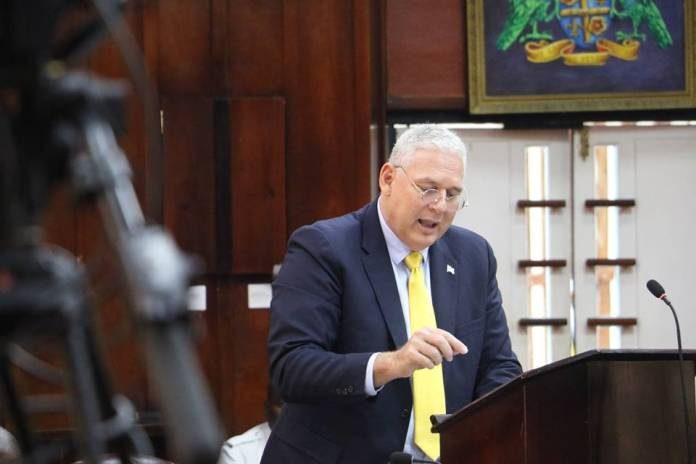Prime Minister Allen Chastanet has presented an EC$1.59 billion budget to Parliament, outlining plans for an accommodation fee within the vital tourism industry, a reform of the income tax system and an excise tax on fuel.
Chastanet, who is also the Finance Minister, told legislators on Monday night that the budgetary proposals, including a capital expenditure of EC$246.7 million and revenue of EC$249.6 million, are designed to achieve growth that will “break the bonds of economic stagnation that has been holding back our country and our people.
“The two previous budgets have built the foundation to cause this transformation. Our restructuring of the economy has helped us to put St. Lucia on a strong financial footing and as a result we have regained the confidence of business people and investors, locally and internationally,” he said.
He said the fiscal package, along with the medium-term development plan that it finances, is the continuation of the government’s plan to put St. Lucia in a position of strength and to have the members of the population be in charge of their own destiny.
“This is going to be a very important year for our country. We must not allow ourselves to get distracted and remember always that poverty, deprivation, under-development and critically lost opportunities are the real enemies. These are the things our government policies and this budget are designed to address.”
Chastanet said that the tourism sector is one of the most significant contributors to economic growth here accounting for 15 per cent of the labour force and earning significant foreign exchange.
But he noted that over a five year period an estimated EC$175 million is used for promoting the island and that the funds are often the result of bond financing that must be borrowed.
“This borrowing not only increases our debt levels, but the resulting cost of servicing this debt increases our interest payments and thereby further limits our fiscal space. This is and has been the practice for some time and has been motivated by a mind-set that the funds borrowed bring awareness to our destination and thereby continue the upward trajectory in arrivals.”
He said the efficiency of this expenditure is tempered by the fact that the disbursement of these funds is subject to the vagaries of the budgeting process and as such are allocated quarterly. These quarterly allocations, limit the range of activities which the Tourism Authority can facilitate and consequently limit the efficiency of this expenditure.”
Chastanet said to deal with the situation, his government is currently in consultation with the industry about instituting an accommodation fee to be used for marketing the island.
“Once the consultation is complete, an announcement will be made on how the fee will be applied. It is expected to be a progressive fee based on the classification of accommodation properties and will include sharing economy providers like Airbnb”
Chastanet said that tourism destinations, including those in the Caribbean, have identified the sharing economy as missed revenue opportunities and are working with the technology facilitators, like Airbnb, to capture this sector’s fair share of taxation.
“We are pursuing our own agreement with Airbnb so that those who benefit from the sharing economy contribute to the development of our tourism product.”
He told legislators that the current personal income tax system presents a number of challenges due to the existing structure of the regime and that apart from the high number of tax bands and rates, 28 allowances and deductions are the highest in the Eastern Caribbean Currency Union (ECCU).
Chastanet said that there’s need to reform the system “to make it simpler, more progressive and less burdensome, and the expectation is that tax compliance will be increased”.
He said the government therefore proposes a new personal income tax system, to be made effective from January 1 next year.
Under the new system, personal allowance will be increased from EC$18,000 to EC$23,000, there will be three tax bands allowing for the first EC$10,000 to be e taxed at a rate of 10 per cent, the next band covering EC$10,001 to EC$20,000 being taxed at 20 per cent and the remaining amounts above EC$20,000, at a tax rate of 30 per cent.
He said the new system will also limit the amount of total deductions that can be claimed up to a maximum or cap of EC$25,000 in any given year, from a list of four categories that include, housing, life insurance, medical and child and education benefits.
Chastanet also announced that pensioners and persons 60 years and older, will not pay any tax on the first EC$31,000 of their income compared to $24,000 under the current regime.
He said regarding land and house taxes, the government had instituted a moratorium on those payments for a three year period ending this year.
“The government is in the process of reviewing the property tax regime for these properties to determine the most equitable and transparent way of basing and assessing properties for purposes of taxation. During this calendar year we will inform of the regime to be implemented effective January 2020 following the broad based consultations with all stakeholders,” he said.
Chastanet said that over the past two financial years, the government had outlined a policy on fuel taxation and prices, saying that the decisions taken on this issue reflected attempts to strike the appropriate balance between the objectives of achieving retail price stability to guard against retail prices above a certain level and the attainment of sufficient revenue towards funding the maintenance of the road network, amidst volatile international prices.
He said increasing oil prices, the targeted excise tax rate of four dollars per gallon was not realized during much of the last financial year, resulting in a budgetary revenue shortfall.
“As a result, the excise tax rate on gasoline and diesel exceeded four dollars during the period December
10, 2018 to March 24, 2019 for gasoline and from February 11 to March 24, 2019 for diesel. This was an attempt to recoup some of the revenue shortfall relative to the approved budget estimates for 2018/19.
“Mr. Speaker, as we approached this new budget year 2019/20, the excise tax rate has been set at four dollars per gallon from March 25th 2019. This has meant that since then, prices at the pump were reduced to below EC$13.95 per gallon for both gasoline and diesel.
“I wish to reiterate that the government’s position remains one of targeting an excise tax rate of four dollars per imperial gallon on gasoline and diesel, subject to retail prices at or below the price cap of $13.95. During the course of this budget year international oil price movements will be closely monitored and the price cap will be reviewed, if necessary, with the goal of maintaining the four dollars excise tax rate,” he said.
In his budget presentation, Chastanet said that the fundamental objective of his administration’s debt management policy is to raise stable and consistent levels of financing for the budget at a minimum cost subject to prudent levels of risk.
He said the preferred strategy of the government is to reduce cost and rollover risk by adopting a multi-pronged approach which includes lengthening the maturity, paying down of its debt while at the same time negotiating more attractive borrowing terms.
He said during the last fiscal year, the authorities implemented the strategy by refinancing EC$194 million of the EC$200 million in Treasury Bills earmarked for conversion into Notes.
“This activity was undertaken at no additional interest cost to government. Of note the investors who opted to remain in the Treasury Bill arrangement received lower interest rates. Apart from maintaining its weighted average cost of borrowing at 5.3 per cent, the roll-over risk and debt maturing in one year were also reduced.”
Chastanet said that the debt maturing in one year dropped from 24.7 to 18.3 per cent and that the Department of Finance will continue to reduce the stock of short-term debt to minimize roll-over risk.
He said in order to expand investor base, the government will be conducting public education on alternative forms of investments for individuals to take advantage of investment opportunities in the current environment of excess liquidity and low interest rates.
“This approach will target citizens here and abroad to invest in their country whilst obtaining a fixed stream of income. Alongside the Investor Relations Programme, the Department of Finance will be undertaking the drafting of the Public Debt Bill to promote transparency and accountability in debt management,” Chastanet told legislators.
Debate on the budget will begin on Wednesday.




